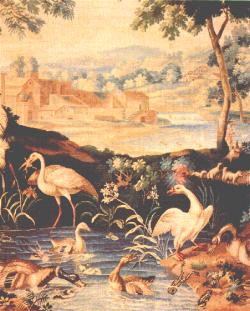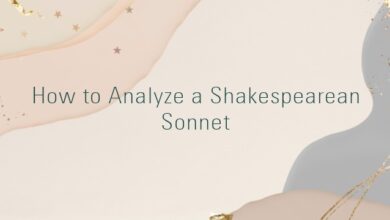
William Shakespeare – Sonnet 15
When I consider every thing that grows
Holds in perfection but a little moment,
That this huge stage presenteth nought but shows
Whereon the stars in secret influence comment;
When I perceive that men as plants increase,
Cheered and checked even by the self-same sky,
Vaunt in their youthful sap, at height decrease,
And wear their brave state out of memory;
Then the conceit of this inconstant stay
Sets you most rich in youth before my sight,
Where wasteful Time debateth with decay
To change your day of youth to sullied night,
And all in war with Time for love of you,
As he takes from you, I engraft you new.
The opening thought rings changes on the perennial theme of mortality which so much engrosses the poet’s attention. He perceives the hand of doom in the minutiae of nature’s processes, and extends the observation to bring it to bear on the beloved youth. Such beauty and perfection is in the young man that the whole world is warring against Time in an effort to prevent his gradual decline from youth into age and death. Yet the poet has an alternative also, that in his verse the youth will live and be immortalised and his beauty will remain eternally new.
This is a variation on the Horatian theme of exegi monumentum aere perennius – I have built a monument more lasting than bronze – and focusses attention not on the poet himself, but on the object commemmorated, the loved one who is the subject of so much praise. With an irony which can hardly have been lost on Shakespeare, the youth attains immortality only as an abstraction, the essence of something beautiful, for we are never told his name and can never flesh him out as it were. But as Shakespeare would have no doubt reminded us,
What’s in a name? That which we call a rose
By any other name would smell as sweet. RJ.II.2.43.
The 1609 Quarto Version
WHen I conſider euery thing that growes
Holds in perfection but a little moment.
That this huge ſtage preſenteth nought but ſhowes
Whereon the Stars in ſecret influence comment.
When I perceiue that men as plants increaſe,
Cheared and checkt euen by the ſelfe-ſame skie:
Vaunt in their youthfull ſap,at height decreaſe,
And were their braue ſtate out of memory.
Then the conceit of this inconſtant ſtay,
Sets you moſt rich in youth before my ſight,
Where waſtfull time debateth with decay
To change your day of youth to ſullied night,
And all in war with Time for loue of you
As he takes from you, I ingraft you new.
Commentary
1. When I consider every thing that grows
When I consider that everything that grows. The phrase seems to be specific, in that it relates only to growing things, and not objects that merely exist, such as ‘brass, stone, earth, boundless sea‘ Sonn. 65, which elsewhere are depicted as undergoing destruction. The poet sees the youth as part of Nature’s grand creation, but sharing the deficiencies of decay and death which all such created growing things have. The phrase When I consider could have a biblical reference. It occurs in Psalms 8.3 in the KJ version of the bible of 1611, but the earlier versions which Shakespeare would have known have, in the Bishop’s Bible (1568) For I will consider thy heauens, euen the workes of thy fingers: the moone and the starres whiche thou hast ordayned. Ps8.3. The Geneva Bible (1587) has For I will consider thy heauens, euen the workes of thy fingers: the moone and the starres whiche thou hast ordayned. Perhaps a closer link is to be found in a passage from Ecclesiastes, which in the Bishop’s Bible version is Thus haue I considered all these thynges that come to passe vnder the sunne: and lo, they are all but vanitie and vexation of mynde.Ec.1.14.
The same opening is used by Milton in one of his sonnets When I consider how my light is spent.2. Holds in perfection but a little moment,Holds in perfection = remains at its state of perfection, encloses perfection within itself. Nature ensures that all organic things reach a point of excellence which has only a brief duration.3. That this huge stage presenteth nought but showsthis huge stage = the world, the globe, the grand scheme of the universe;
presenteth naught but shows = gives nothing but dramatic spectacles, sham performances. An assertion that the visual reality of the world is illusory, that since it is momentary in its transience, it should not be given great credence or have any sense of worth attached to it. Shakespeare’s stage experience would add a special lustre to the imagery of this line.The ‘realities’ of our existence are as fleeting as the scenes set forth on the boards of the Globe theatre. Perhaps also a reference to Plato’s cave, in which reality is depicted as the shadows cast on he wall of a cave by figures dancing in front of a fire, the dancing figures being forever enclosed and never catching a glimpse of daylight.4. Whereon the stars in secret influence comment;Whereon = upon which;
in secret influence comment = make hidden decisions which influence the things viewed. An invisible fluid was supposed to emanate from the stars which had an effect on the world. in secret influence also suggests secret meetings which decide the fate of individuals. comment is from the Latin commentare ‘to devise, invent’, hence with a suggestion of ‘to devise some future fate’.5. When I perceive that men as plants increase,increase = grow, develop, increase in stature; multiply.
6. Cheered and checked even by the self-same sky,
checked = stopped, obstructed. Bad weather would check a plant’s growth (the word is still used by gardeners).
the self-same sky – the same sky which regulates the life of plants, controls also that of humans. Perhaps there is a sideways glance at the almost proverbial notion that the same sun looks on the nobility and the lowly alike, with no distinction. See for example Perdita’s exclamation in The Winter’s Tale when she is rudely prevented from marrying Florizel:
I was not much afeard; for once or twice
I was about to speak and tell him plainly,
The selfsame sun that shines upon his court
Hides not his visage from our cottage but
Looks on alike. WT.IV.4.434-37.
The poet could be hinting that noble birth does not set the youth as high above all surrounding mortality as he believes.7. Vaunt in their youthful sap, at height decrease,Vaunt in their youthful sap = put on a boastful show (vaunt) when they are young, when their sap is green and vigorous, as in a young plant. at height decrease = decline after they have reached their full growth.8. And wear their brave state out of memory;
Wear down to absolute nothingness, after reaching their pinnacle, so that they are totally forgotten (out of memory).
their brave state = the proud moment of their glory, their gallantry. The subject is still plants, or men, of line 5.
The idea is essentially that of something being totally worn out, as a piece of clothing, which becomes no longer usable, and also that of of a thing discarded and no longer remembered, or of those long dead and forgotten. As Adam, the old servant in As You Like it saysWhen service should in my old limbs lie lameAnd unregarded age in corners thrown. AYL II.3.42-39. Then the conceit of this inconstant stayconceit = thought, consideration. It does not have the modern meaning of ‘an exaggerated estimate of one’s own worth’ (OED6).
this inconstant stay = our life here upon this earth, which is full of unpredictability. Also, of short duration.10. Sets you most rich in youth before my sight,most rich in youth – in contrast with the scenes of desolation which must follow, your youthfulness is a time of richness.
Sets you perhaps also suggests a stage setting.11. Where wasteful Time debateth with decay
Time and decay are personified here, as two gruesome characters who discuss how best to achieve their hated aims, the destruction of living things. In effect of course they are both part of the same scene – Time brings decay, and decay is inseparable from any living or extant form. In Coleridge’s Ancient Mariner the two spirits, Death, and Life-in-Death, dice for the soul of the mariner. (AM. Part IV).12. To change your day of youth to sullied night,your day of youth = your youthful days. The singular noun gives a more forceful picture than the common phrase, as if highlighting a particular recent day when the youth was at his best.
sullied night – night is black and dingy. hideous night and ghastly night are used elsewhere in the sonnets (12 & 27).13. And all in war with Time for love of you,Love of the youth is declared to be universal. But all are powerless to rescue him from Time’s swift foot, and they make war against Time in the fruitless hope of saving him.14. As he takes from you, I engraft you new.
He = Time. The engrafting is presumably the act of describing and celebrating the youth in verse, which gives him each time a new lease of life, as a gardener would (en)graft a new slip of wood onto an old root or stock to create a new tree.






